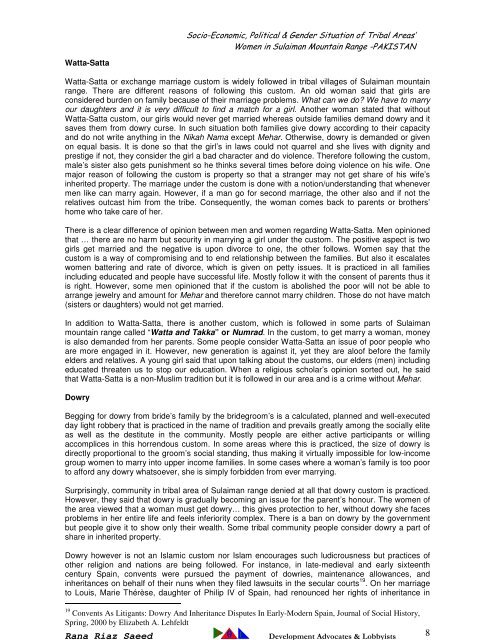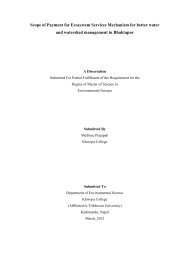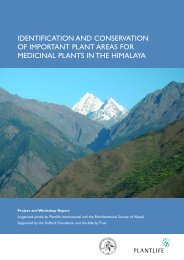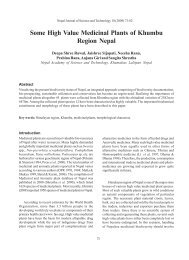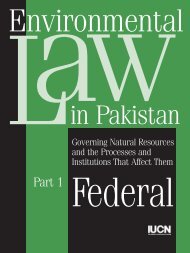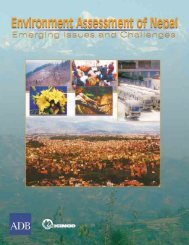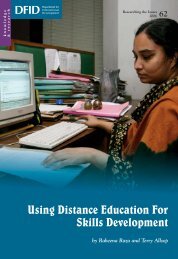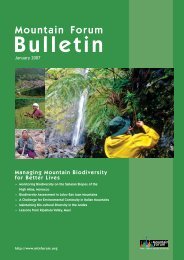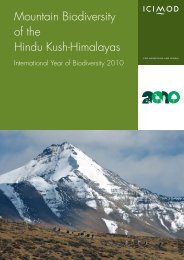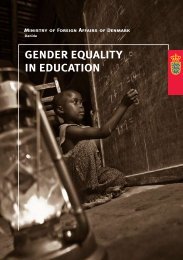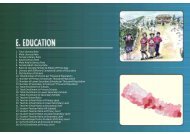Rana Riaz Saeed 1 - ResearchGate
Rana Riaz Saeed 1 - ResearchGate
Rana Riaz Saeed 1 - ResearchGate
Create successful ePaper yourself
Turn your PDF publications into a flip-book with our unique Google optimized e-Paper software.
Socio-Economic, Political & Gender Situation of Tribal Areas’<br />
Women in Sulaiman Mountain Range -PAKISTAN<br />
Watta-Satta<br />
Watta-Satta or exchange marriage custom is widely followed in tribal villages of Sulaiman mountain<br />
range. There are different reasons of following this custom. An old woman said that girls are<br />
considered burden on family because of their marriage problems. What can we do? We have to marry<br />
our daughters and it is very difficult to find a match for a girl. Another woman stated that without<br />
Watta-Satta custom, our girls would never get married whereas outside families demand dowry and it<br />
saves them from dowry curse. In such situation both families give dowry according to their capacity<br />
and do not write anything in the Nikah Nama except Mehar. Otherwise, dowry is demanded or given<br />
on equal basis. It is done so that the girl’s in laws could not quarrel and she lives with dignity and<br />
prestige if not, they consider the girl a bad character and do violence. Therefore following the custom,<br />
male’s sister also gets punishment so he thinks several times before doing violence on his wife. One<br />
major reason of following the custom is property so that a stranger may not get share of his wife’s<br />
inherited property. The marriage under the custom is done with a notion/understanding that whenever<br />
men like can marry again. However, if a man go for second marriage, the other also and if not the<br />
relatives outcast him from the tribe. Consequently, the woman comes back to parents or brothers’<br />
home who take care of her.<br />
There is a clear difference of opinion between men and women regarding Watta-Satta. Men opinioned<br />
that … there are no harm but security in marrying a girl under the custom. The positive aspect is two<br />
girls get married and the negative is upon divorce to one, the other follows. Women say that the<br />
custom is a way of compromising and to end relationship between the families. But also it escalates<br />
women battering and rate of divorce, which is given on petty issues. It is practiced in all families<br />
including educated and people have successful life. Mostly follow it with the consent of parents thus it<br />
is right. However, some men opinioned that if the custom is abolished the poor will not be able to<br />
arrange jewelry and amount for Mehar and therefore cannot marry children. Those do not have match<br />
(sisters or daughters) would not get married.<br />
In addition to Watta-Satta, there is another custom, which is followed in some parts of Sulaiman<br />
mountain range called “Watta and Takka” or Numrad. In the custom, to get marry a woman, money<br />
is also demanded from her parents. Some people consider Watta-Satta an issue of poor people who<br />
are more engaged in it. However, new generation is against it, yet they are aloof before the family<br />
elders and relatives. A young girl said that upon talking about the customs, our elders (men) including<br />
educated threaten us to stop our education. When a religious scholar’s opinion sorted out, he said<br />
that Watta-Satta is a non-Muslim tradition but it is followed in our area and is a crime without Mehar.<br />
Dowry<br />
Begging for dowry from bride’s family by the bridegroom’s is a calculated, planned and well-executed<br />
day light robbery that is practiced in the name of tradition and prevails greatly among the socially elite<br />
as well as the destitute in the community. Mostly people are either active participants or willing<br />
accomplices in this horrendous custom. In some areas where this is practiced, the size of dowry is<br />
directly proportional to the groom’s social standing, thus making it virtually impossible for low-income<br />
group women to marry into upper income families. In some cases where a woman’s family is too poor<br />
to afford any dowry whatsoever, she is simply forbidden from ever marrying.<br />
Surprisingly, community in tribal area of Sulaiman range denied at all that dowry custom is practiced.<br />
However, they said that dowry is gradually becoming an issue for the parent’s honour. The women of<br />
the area viewed that a woman must get dowry… this gives protection to her, without dowry she faces<br />
problems in her entire life and feels inferiority complex. There is a ban on dowry by the government<br />
but people give it to show only their wealth. Some tribal community people consider dowry a part of<br />
share in inherited property.<br />
Dowry however is not an Islamic custom nor Islam encourages such ludicrousness but practices of<br />
other religion and nations are being followed. For instance, in late-medieval and early sixteenth<br />
century Spain, convents were pursued the payment of dowries, maintenance allowances, and<br />
inheritances on behalf of their nuns when they filed lawsuits in the secular courts 19 . On her marriage<br />
to Louis, Marie Thérèse, daughter of Philip IV of Spain, had renounced her rights of inheritance in<br />
19 Convents As Litigants: Dowry And Inheritance Disputes In Early-Modern Spain, Journal of Social History,<br />
Spring, 2000 by Elizabeth A. Lehfeldt<br />
<strong>Rana</strong> <strong>Riaz</strong> <strong>Saeed</strong> Development Advocates & Lobbyists 8


